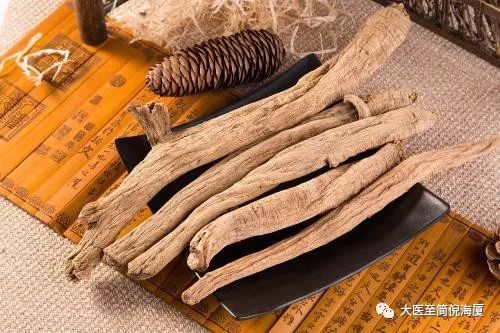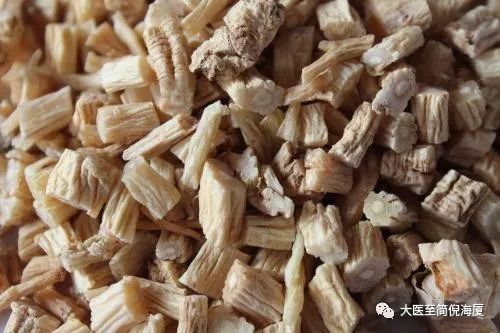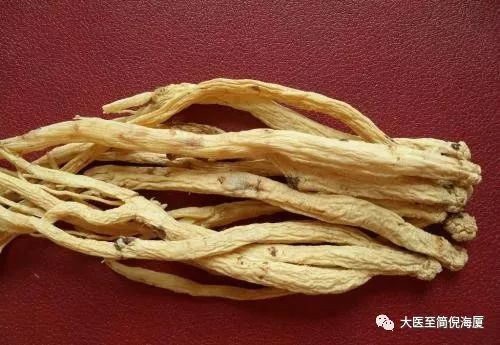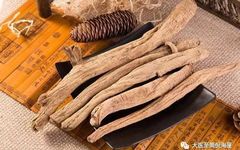Alias: Xi Dang Shen, Dong Dang Shen, Fang Dang Shen, Shang Dang Shen, Lu Dang Shen, Ye Dang Shen, Ye Tai Shen, Ye Tai Dang, Ye Tai Dang Shen, Huang Shen, Liao Shen, San Ye Cai Gen, Ye Zi Cao Gen, etc.
Properties and Channels: Sweet in flavor, neutral in nature, enters the Spleen and Lung meridians.
Modern Research: Dang Shen primarily contains sterols, dang shen saponins, dang shen polysaccharides, dang shen lactones, alkaloids, inorganic elements, amino acids, and trace elements. Pharmacological studies indicate that Dang Shen enhances immune function, regulates gastrointestinal motility, has anti-ulcer properties, increases red blood cells, hemoglobin, and reticulocytes, delays aging, resists hypoxia, and has anti-radiation effects.
Selection and Storage: When selecting Dang Shen, choose roots that are thick, with loose skin, transverse striations, a soft and moist texture, and a sweet taste. After drying, cool and store in a sealed package to prevent mold, pests, and rancidity.

Effects and Characteristics:
The most prominent effect of Dang Shen is its ability to tonify Qi, primarily entering the Spleen and Lung meridians, making it a key herb for replenishing the Qi of the Spleen and Lung. It is commonly used to treat symptoms of Qi deficiency such as fatigue, poor appetite, and loose stools, often combined with Qi-tonifying herbs like Bai Zhu (White Atractylodes) and Fu Ling (Poria). For cough and shortness of breath due to Lung Qi deficiency, it is often used with Huang Qi (Astragalus) and Ge Jie (Gecko) to tonify Lung Qi and relieve cough. Dang Shen has a mild nature, neither drying nor warming, not cold or greasy, and lacks the harsh properties of Ren Shen (Ginseng). While its tonifying effects on the Spleen and Lung are similar to those of Ren Shen, its potency is weaker, so larger doses of Dang Shen are often used as a substitute for Ren Shen in clinical practice.
Dang Shen is typically decocted in water, with a dosage of 9-30 grams. As a tonic, it is not suitable for patients with excess conditions or heat diseases. Additionally, according to the “Eighteen Contradictions” of Chinese medicine, Dang Shen should not be used with Li Lu (Veratrum) or any herbs containing Li Lu to avoid adverse reactions.
Proven Formulas:
Double Ginseng Longan Juice: 500 grams of Dang Shen (sliced), 250 grams of Sha Shen (Glehnia), 120 grams of longan flesh, decocted to a concentrated juice, dripped until it forms beads, stored in porcelain. Take one wine cup, mixed with hot water, or can be added to the decoction for treatment of Qi deficiency, low voice, and weakness in the limbs.

Available Medicinal Products:
Shen Qi Pian (Syrup): Tonifies the Spleen and benefits Qi, used for weakness and fatigue due to Spleen Qi deficiency.
Jian Pi Yi Shen Granules: Strengthens the Spleen and benefits the Kidneys, used for symptoms of Spleen and Kidney deficiency such as abdominal distension, poor appetite, pale complexion, fatigue, and weakness in the lower back and knees; can alleviate adverse reactions in cancer patients undergoing radiotherapy and chemotherapy, enhancing immune function.
Classic Medicinal Dishes:
Dang Shen and Fu Ling Stewed Pigeon: One pigeon, 12 grams of Dang Shen, 6 grams each of Fu Ling and Bai Zhu, 3 grams of licorice, 15 red dates. Clean the pigeon and herbs, place in a clay pot, add appropriate water, boil, then simmer on low heat for 50 minutes, season with salt. This dish enhances gastrointestinal function, suitable for those with poor appetite and prone to abdominal distension; regular consumption can improve immune function and strengthen the body, preventing disease.

Dang Shen, Huang Qi, and Mushroom Chicken: 100 grams of tender hen meat, 30 grams of Dang Shen, 45 grams of Huang Qi, 30 grams of mushrooms, ginger, cooking wine, and salt to taste. Remove bones from the chicken, cut into small pieces; clean and slice Dang Shen, Huang Qi, and mushrooms (soaked in water), slice ginger. Mix chicken, Dang Shen, Huang Qi, mushrooms, ginger, cooking wine, and salt, let sit for 5-10 minutes, then steam in a pot for one and a half hours. Consume every 3-4 days. This dish tonifies the middle, benefits Qi, harmonizes the Spleen and Stomach, stabilizes the exterior, stops sweating, lowers fat, and strengthens the body, beneficial for the elderly with Spleen and Stomach deficiency, and for those with prolapse of the stomach or uterus.
Dang Shen and Red Date Stewed Pork Ribs: 30 grams of Dang Shen, 8 red dates, 500 grams of pork ribs, ginger, scallions, salt, monosodium glutamate, flour, and cooking wine to taste. Place ribs, Dang Shen, red dates, ginger, scallions, and cooking wine in a stewing pot, add appropriate water, bring to a boil, then simmer until cooked, adding salt, monosodium glutamate, and flour to finish. This dish tonifies Qi and blood, benefiting health, suitable for those with physical weakness.
Dang Shen and Rice Porridge: 50 grams of Dang Shen, 100 grams of rice, appropriate brown sugar. Clean and slice Dang Shen; wash and dry the rice, then roast until golden. Combine Dang Shen and roasted rice in a pot, add appropriate water, simmer for 50 minutes, and add brown sugar to serve. This porridge tonifies Qi, nourishes blood, and strengthens the Spleen, suitable for those with Qi deficiency, post-illness weakness, poor appetite, and digestive issues.

